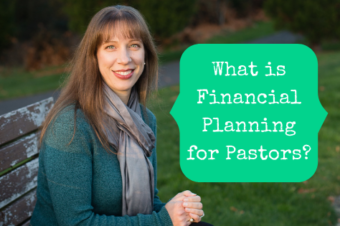Today’s post is going to be a review of a book written especially for YOU; The Minister’s Retirement, by C.J. Cagle. The author contacted me through this blog late last year offering to send me a copy and I finally found the time to read it on a flight this spring.
Some Context
Going in, I knew nothing of the book or the author, only that over six months ago I had said I would read the book and I like to be a woman of my word. While The Minister’s Retirement doesn’t sound like my first choice for vacation reading (especially after spending the last two years studying finance in-depth), six hours on an airplane is just too valuable to waste.
I should probably also give you some context for who I am as a reviewer. First of all, I’ve been studying pastoral finances for the past five years. I just completed a Master’s in Family Financial Planning and Counseling, and in March, I passed the CFP exam on my first try. On top of that, I am one of those gifted (or cursed, depending on how you view it) people who see typos in everything. Really, everything. I even notice when there is an extra space between the words in a song during worship. Suffice it to say, you probably won’t find a tougher critic for a pastoral finance book.
About The Author
As soon as we took off, I cracked open the cover and I was pleasantly surprised. It’s a really good book, both in content and delivery. Now, it’s not John Grisham or Malcolm Gladwell, but the author writes as well as I do, so I can’t complain.
The author himself is not a financial professional. He was an IT architect/strategist for several decades and is now retired. I think the fact that he is retired makes the book better because his thoughts and opinions are more personal and tangible rather than just theoretical. He currently serves as a deacon in his local church leading the stewardship ministry and blogs at retirementstewardship.com.
First Impressions
The truth is, I had a favorable impression of the book before even opening it. It has a well-designed cover and is made with good quality paper and cardstock. They say not to judge a book by its cover, but this one is just as good on the inside as it is on the outside.
Cagle lays things out simply in a way that is both easy to read and easy to understand. He writes so that almost no previous financial knowledge is required of the reader and yet it is not so basic that a knowledgeable person cannot enjoy it. It is not dumbed-down. He tells you everything you need to know about complex topics without getting mired in the details or calculations—he only gives the necessary and saves you from the unnecessary.
It is a very thorough book. Every time I found myself thinking, “He should mention…” he mentioned it in the very next paragraph or on the next page. My thoughts transitioned from, “Will he?” to “How will he?” as he failed to disappoint me with every chapter.
Contents Of The Book
The book consists of ten chapters, an introduction and conclusion, and a list of resources and endnotes. I’ll admit that endnotes bother me because I don’t like having to flip back and forth in the book. If you don’t want to flip, rest assured, because you can ignore all of the endnotes and not have any trouble understanding the book. They just always pique my curiosity so I end up flipping and reading them all.
These are the chapters covered in the book:
- Why Should a Minister Plan for Retirement?
- What are the Minister’s Unique Challenges in Preparing for Retirement?
- Should a Minister Opt out of Social Security?
- What Types of Retirement Savings Accounts are Available to a Minister?
- Where do Pensions and Annuities Fit in a Minister’s Retirement?
- How Should a Minister Save and Invest for Retirement?
- Does a Minister Need to Hire a Financial Advisor?
- What Can a Minister Do Who is Behind in Saving for Retirement?
- How can a Minister Estimate and then Generate the Income They’ll Need in Retirement?
- What Kinds of Insurance Does a Minister Need Before and During Retirement?
I won’t repeat the information in the book, but I will make a few observations. In the chapter on opting out of Social Security, he gave a fair and balanced presentation. His explanation of the differences between Roth and traditional retirement accounts was very good. The book even covers Roth conversions, which is a very useful financial planning strategy that is not well known to the general public.
Cagle’s explanation of how annuities work is clear, simple, and understandable, unlike annuities themselves. His guidance on investing is excellent—not just for pastors but for everyone. I love that he included pages 110 and 111 (no spoiler here!). The book has a lot of good advice and it ends with a healthy balance between faith and wise stewardship.
Should You Read This Book?
These are the questions I consider when evaluating a finance book:
- Is it accurate information?
- Is it helpful or important information?
- Is it presented in a way that non-financial people can understand?
Cagle’s book is a resounding yes for all three and wins my full approval. I would recommend this book to any pastor who is thinking about retirement. Honestly, I can’t imagine a less onerous finance book. I read all 153 pages without falling asleep after waking up at 4 am. That says a lot from someone who can’t get through three pages in a finance textbook without stealing a few Zs. (It took about 4 ½ hours total to read, in case you were wondering.)
After reading his book, I would say that C.J. Cagle is a voice you can trust. I think he has the same heart as I do with what I’m doing here at Pastor’s Wallet.
Things To Note If You Read It
There are just a few things that I want to make note of if you choose to read this book. First of all, it assumes that all ministers are men. If you are progressive, please don’t get offended. Historically, most ministers were men. Also historically, in the English language, the masculine pronouns have been used when referring to a hypothetical person of unknown gender. Please don’t let it cause you to miss out on the excellent information found in this book.
On page 44, it refers to churches giving the pastor some extra salary to help offset the cost of his Social Security and Medicare taxes. I just want you to know that if you do that, the extra salary is considered taxable income to the pastor and it will be subject to both income and self-employment taxes. Page 46 also mentions churches withholding SECA taxes, which they aren’t allowed to do.
In the graph on page 63, some of the information is different now because of the passage of the SECURE Act. Under the new law, anyone with earned income (or their spouse) can contribute to an IRA regardless of age. Also, the dollar amounts listed adjust from time to time, so make sure to double-check the limits for the tax year you are in. The SECURE Act also changed the age for required minimum distributions, which are discussed on page 137, to age 72.
A final correction, on page 155 it says that an HSA is not tax-free unless it is part of a group plan. Anyone eligible to contribute to an HSA receives the same tax benefits, whether they set it up individually or their employer does. When you do it on your own, you just have to wait until you file your tax return for the benefits. Another thing about HSAs that isn’t mentioned in the book is that they can also be a great retirement savings vehicle.
Where To Purchase A Copy
If you’re interested, you can purchase the book on Amazon here. And no, I don’t receive any commissions or payments if you buy a copy with that link. All I get is the satisfaction of knowing my readers are well taken care of and have good information at their fingertips.
If you read it and like the book, don’t forget to leave him a glowing review!








